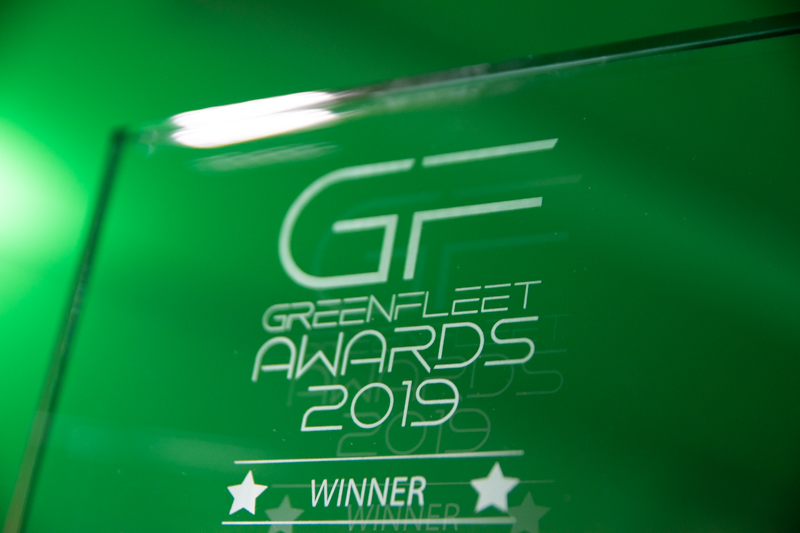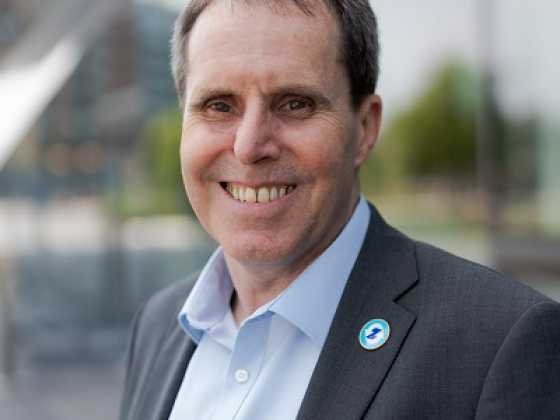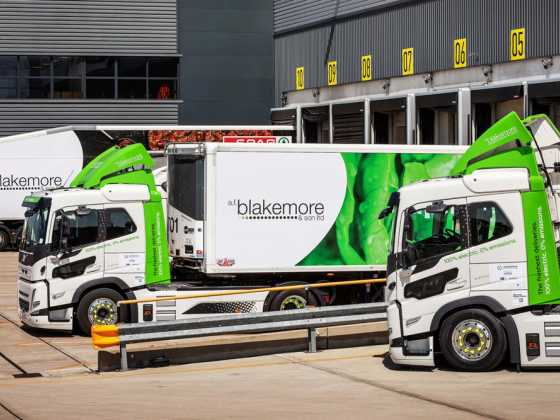High praise for committed green fleet professionals

Fleet operators, vehicle manufacturers and other companies serving the fleet industry were praised for their commitment to reducing emissions at the 15th annual GreenFleet Awards, which took place on 14 November at the British Motor Museum
The GreenFleet Awards celebrate all those committed to reducing transport emissions, from fleets doing all they can to reduce the environmental impact of their operations, to the manufacturers tirelessly improving the green credentials of their vehicles and the companies supporting fleets on their low-emission journey.
There has been a string of new policies and targets for decarbonising road transport. The UK government has enshrined in law targets to become net-zero emission by 2050 and wants all new cars to be effectively zero emission by 2040. All of this filters down to increased pressure on transport and fleet operators.
Encouragingly, in October, the SMMT reported that battery electric vehicle registrations almost tripled, up
+151.8 per cent to 3,162 units.
Things are moving in the right direction, but with the cost of upgrading to a cleaner fleet, the range of EVs, recharging limitations, and difficulties in greening larger commercial vehicles, converting to an environmentally-friendly fleet does come with its challenges.
The GreenFleet Awards recognise those individuals and organisations that are making a difference, despite the challenges.
The 2019 Awards, sponsored by the Algorithm People, took place at the British Motor Museum and were presented by magician and comedian Pete Firman. Guests were treated to a pre-dinner reception, sponsored by electric van makers, LDV, followed by a three course dinner.
Milk & More scooped the award for Outstanding Achievement for converting its entire 500-strong fleet to electric vehicles, making it the largest EV fleet in the country. Using a mix of StreetScooters and LDV EV80s, the electric vans will be used to provide silent and emissions-free morning milk deliveries.
IT Innovation
ADESA UK won the award for IT Innovation Award for its Intelligent Vehicle Inspection, a new service which helps address the environmental impact of de-fleeting. In the physical auction world, ADES estimates vehicles typically amass 21 idle days between being de-fleeted and sold. During that time, they prompt multiple vehicle movements, all of which have an environmental impact. With ADESA IVI, cutting-edge IT is used to significantly reduce the environmental impact of de-fleeted company cars for vendors and buyers. Company car drivers carry out their own vehicle inspection prior to end of contract. Using a smartphone or tablet, they follow a menu driven template to capture pre-defined images. AI is employed to automatically assess any damage and produce a fully costed damage report, and then dealers can bid for the car online.
The Private hire / Taxi Company of the Year award was presented to Premier Cabs for its significant investment into electric vehicles and charging infrastructure. In February 2015, Premier Cabs in Blackpool introduced its first electric taxis. Since then its fleet of electric taxis has grown to over 100 pure EVs and 62 hybrid EVs.
The company has installed its own company funded network of charging stations at six locations throughout Blackpool, with a total of 16 rapid chargers, for the exclusive use of its taxis. To date the total amount invested into the scheme is close to £3.5 million, which was spent on purchasing brand new electric and hybrid electric vehicles. The amount invested into this charging network is over £500,000. To date, Premier’s electric fleet has now completed around ten million miles at an estimated cost saving of £1.6 million on fuel alone.
In September 2018, Premier banned the use of diesel vehicles on its fleets across Blackpool and Lytham St Annes. What’s more, Premier’s dispatch system is
set up to reduce the number of miles travelled whilst empty.
Encouraging EV uptake
Winning Leasing Company of the Year for the second year in a row, LeasePlan impressed judges with its impressive all-round service in the push to encourage the uptake of EVs, with internal and external educational and promotional campaigns. This has led their clients’ appetite for ULEVs to grow, with the number of EVs and PHEVs on fleet growing more than 35% year-on-year.
LeasePlan also has a target to achieve net zero emissions by 2030, which has lead to a host of new initiatives. This includes starting a ‘Start Electric’ marketing campaign, which involved Start Electric ‘ride and drive’ Tesla experiences and Love e-LCV event for commercial fleet operators. What’s more, LeasePlan is a founding member of the EV100 initiative.
In a highly competitive category, the Charging and Refuelling Infrastructure Company of the Year Award was presented to Elmtronics. Believing in a world where electrified mobility is fully inclusive, Elmtronics has installed over 5,000 domestic, public and workplace charge points, from 7kW home solutions to 150kW rapid chargers. Since January 2019, its Hubsta back office programme has over 2,000 members recording over 100,000 charging logs, saving 170,000 tonnes of CO2. Elmtronics has partnered with blue light authorities, councils and NHS Trusts, as well as EDF Energy, FedEx, Nike, Tata Steel, BMW Group, and Groupe PSA. Its primary objective is to improve the lives of individuals in cities through giving them cleaner air to breathe.
Mobility
Mobility is the new buzz word as fleet operators challenge traditional ways of conducting business journeys. Europcar Mobility Group scooped the award for Mobility Provider of the Year, sponsored by Fuelmii.
As well as seeing a 55 per cent growth in electric vehicles on the core Europcar rental fleet in the last 12 months, the company has also seen a 150 per cent increase in EV charge points at Europcar locations around the UK. The company is also holding ‘clinics’ for businesses facing the ULEZ in London and is supporting TfL’s scrappage scheme, giving firms an alternative to vehicle ownership. What’s more, Europcar One has rolled out to more than 1,300 business customers, delivering the most efficient customer journeys and helping fleet managers analyse different mobility options.
Commercial vehicles
The LGV Manufacturer of the Year award went to Volvo Trucks. Volvo Trucks believes that greener, sustainable transport is a driver of sustainable development and a precondition for economic growth and in 2019 introduced the FL and FE all-electric vehicles that will drastically reduce noise and exhaust emissions in urban environments. Euro 6-compliant Volvo FH and FM LNG trucks running on liquefied natural gas (LNG) or biogas also arrived this year, with CO2 emissions around 20-100 per cent lower than diesels. Six autonomous FH trucks are also running on a three-mile route from an open pit mine to a nearby port in Norway, and ‘Vera’, a new autonomous all-electric vehicle, offers a view of cleaner transportation in the future.
Electric van makers LDV, distributed by Harris Automotive Distributors, won the award for LCV Manufacturer of the Year. LDV’s much-lauded electric vehicle range began with the EV80 and has been designed with zero emissions technology together with advanced electric power systems. In 2019 it launched the smaller EV30, and available from Q1 2020, it will be the first vehicle in the EV range that will only come as a zero-emission, fully electric vehicle. Choice and value for money are fleet and business drivers and LDV’s range includes panel van, chassis cab and crew. Focused on the future, the company has plans to launch plug-in hybrid, hybrid and a hydrogen fuel cell CV in coming years. It works with customers to conduct feasibility studies on the whole life cost of an EV fleet versus the cost of their existing fleet, and offers a six-year finance trade-in deal.
Greener vehicles
Suzuki won the City Car Manufacturer of the Year Award for its Smart Hybrid system. Alongside 1.0-litre ‘Boosterjet’ and 1.2-litre ‘Dualjet’ efficient petrol engines, Suzuki also markets a mild-hybrid version of its Swift supermini. The Smart Hybrid Vehicle by Suzuki (SHVS) system incorporates an Integrated Starter Generator (ISG) which acts as both a generator and starter motor. Belt-driven, the ISG assists the engine during take-off and acceleration and generates electricity through regenerative braking. A small lithium-ion battery under the passenger seat stores energy and has an idle stop function operated via the ISG. In both the Swift, and the Ignis city car which also features the compact system, SHVS lowers CO2 emissions to a minimum of 98g/km.
Toyota won the award for Fleet Car Manufacturer of the Year Award, sponsored by Elmtronics, for offering fleets a choice of 20 alternatively fuelled models, including one plug-in hybrid and one hydrogen fuel cell vehicle. Toyota and Lexus accounted for nearly 50 per cent of all UK alternative fuel vehicle sales in 2018. Self-charging hybrid currently represents the most convenient and cost-effective path for fleets to swiftly transition to greener motoring. More and more businesses are discovering the benefits they offer.
Electric and hybrid mobility
The PHEV Manufacturer of the Year Award went to Volvo for having a plug-in version of every model it makes. From the XC40, XC60 and XC90 SUVs to the S60 and S90 saloons, and the V60 and V90 estates, the Swedish manufacturer has a plug-in for everyone. All use petrol-electric ‘Twin Engine’ tech to lower emissions and offer three driving modes. The XC40 T5 Twin Engine has emissions as low as 38g/km.
Standing out in a highly competitive category, Renault scooped the award for Electric Vehicle Manufacturer of the Year, sponsored by ElectrAssure, for making electric mobility a realistic option for business users.
The New ZOE is leading the brand’s EV charge, with its 245 mile (WLTP) range, a completely new interior with recycled interior plastics and upholstery as well as excellent ownership costs. The pure electric hatchback sets new standards in its segment. Groupe Renault Fleet Director Mark Dickens commented: “We’re delighted to win Electric Vehicle Manufacturer of the Year at the Green Fleet Award for a second time. It once again demonstrates that Renault is a market leader in this sector, committed to delivering electric vehicles that appeal to both individual and corporate customers across the UK. New ZOE in particular demonstrates this approach, with its enhanced range, zero tailpipe emissions, low taxation and smooth, silent running making it an extremely attractive and cost effective option for many fleet customers.”
Renault also received commendations in the City Car and LCV categories, with New ZOE and New Master Z.E. respectively being recognised by the judges. Not only is the new ZOE the most affordable vehicle in its segment, its increased range makes it an attractive and realistic option for fleet users.
For the new Master Z.E. the models trademark class-leading space and versatility are matched to an even more car-like interior that doubles as a mobile office. Externally, the introduction of LED technology creates an even more distinctive appearance.
Renault’s range of EV models currently runs to the Twizy and New ZOE, with plug-in hybrid (PHEV) and hybrid (HEV) E-TECH versions of the All New Captur and All-New Clio due in 2020. The brand’s commercial fleet is equally extensive, with the Twizy Cargo, Kangoo Z.E. 33 and New Master Z.E. offering businesses a wide choice of zero tailpipe emissions vans.
Fleets leading the way
The Private Sector Fleet of the Year Award in the small to medium category, sponsored by The Algorithm People, went to Gnewt by Menzies.
In 2017, Menzies Distribution acquired Gnewt, the largest all electric parcel delivery fleet in the UK. The Gnewt depot in Bow is home to 60 smart inter-connected chargers, the largest of its kind in London. Gnewt drivers plug in their vehicles in the depot overnight and return in the morning to a fully charged van. Gnewt will soon be adding another 20 chargers. Gnewt is currently working towards a Vehicle to Grid (V2G) solution that would feed energy from the vehicles back to the grid at peak times and charging up the vehicles during off-peak times. The company is in the process of adding 10 vehicle-to-grid units in its hub in Bow, meaning they will soon be proud owners of the largest vehicle to grid operation in London.
It’s commitment to the environment and air quality has meant that Gnewt by Menzies Distribution has saved 135.5 tons of carbon in 2019 alone.
The Private Sector Fleet of the Year Award in the medium to large category, sponsored by SRG Electrical, went to online supermarket Ocado. The company became the first UK retailer to fully fund the purchase of an onsite grid connected natural gas refuelling station outright, at a cost of £3 million.
The Gasrec designed and developed filling station powers Ocado’s fleet of 29 CNG biomethane trucks, which represent 20 per cent of the online retailer’s HGV fleet. In addition to the CNG tractors and a hydrogen dual fuel trial, Ocado has just put 15 electric home delivery vans on the road in its Park Royal site; these vans are 4.25t BD Auto vehicles making use of the category B licence derogation for alternatively fuelled vehicles. This means they can achieve payload parity without increasing the number of vehicles.
Darren Smith, Heathrow’s Fleet Standards and Delivery Manager, scooped the Private Sector Fleet Manager of the Year Award, sponsored by Europcar Mobility Group UK.
Darren and his team are responsible for delivering Heathrow 2.0, the airport’s plan for sustainable growth, which aims to establish Heathrow as a world-leading airport in reducing emissions, both on and off and airport. Darren is responsible for all Heathrow’s own vehicles and associated contracts and is a leading figure in the implementation of Heathrow’s Airside Ultra Low Emission Zone due to be in place in 2025. Darren, along with his team, has transformed the Heathrow fleet from four Nissan Leafs in 2016 and no infrastructure to a fleet of 98 electric or PHEVs which can be charged at over 100 charging points.
Public sector fleets
The Public Sector Fleet of the Year (small to medium), sponsored by Daimler Fleet Management, was won by Changeworks. The charity has undergone an entire fleet transition from one predominately consisting of diesel vehicles, to one dominated by EVs and self charging hybrids. As well as a reduction in NOx emissions, the average CO2 emissions per vehicle has reduced from 92 g/km to an impressive 74 g/km. Fuel purchasing has reduced by 25%. The size of the fleet was reduced by using data to identify patterns of demand. Then behaviour change measures were introduced to maximise utilisation of EVs and ensure more efficient use of cars. Enterprise Car Club, electric bikes and a cargo bike were brought in to cover demand at peak times. Larger vehicles were replaced by smaller vehicles and diesel vans were replaced with Hybrid cars. Changeworks estimates it will save over 17 tonnes of CO22over the next three years. The Metropolitan Police Service won the Public Sector Fleet of the Year award (medium to large), sponsored by The Algorithm People.
In line with the Mayor’s vision of making London a zero carbon city by 2050, the Metropolitan Police Service (MPS) is striving towards the end goal of having a zero emission fleet by 2050. Within its own Fleet Services Air Quality Strategy 2017-2020, it has committed to having 550 zero or ultra-low emission vehicles within the fleet (which on a whole, totals up to circa 4,800 different types of vehicles) by the end of 2020. As of October 2019, the Met has 544 electric, hybrid, or hydrogen vehicles in operation (99% of the target). A further target is to have its entire General Purpose fleet of vehicles to be ultra-low emission by 2025. Currently, 360 out of 796 (45 per cent) of these vehicles are zero or ultra-low emission. The Met is also trialling 21 hydrogen- powered Toyota Mirais, which have clocked up over 260,000 emission free miles.
The Public Sector Fleet Manager of the Year title, sponsored by Toyota & Lexus Fleet, was given to Chris Lane from the University of Birmingham. The University operates a centrally managed diverse fleet of 110 vehicles, these range from 3.5 tonne refrigerated vehicles, smaller light commercial vehicles and cars. Due to restructuring in 2018, Chris took on the full scope of managing fleet operations, taking over from an excellent fleet manager who had made significant developments across the fleet. It was therefore important to maintain the momentum. During 2019, the university had already achieved the stated objective of 40% of the fleet being alternatively fuelled vehicles by 2020 – a year early. The university is now looking at vehicles where battery range might be an issue. The university’s electric ‘pool’ vehicle is allowing staff to experience an electric vehicle when their own car is in maintenance to get them used to it.
Industry innovation
Urban Electric won the GreenFleet Award for Industry Innovation for delivering the world’s first pop-up charger that delivers the convenience of home smart charging, without causing street clutter. The UEone is designed primarily for night time charging in residential streets and retracts fully underground when not in use. In addition, Urban Electric is working with Appy Parking to integrate charging onto its parking platform, so that EV drivers can locate, operate, and pay for parking and charging in public parking bays via a single app.
There were also five EV Champion Awards handed out on the day to individuals committed to EV adoption and raising awareness of zero-emission motoring. This year’s EV Champions were Alun Davies from ElectrAssure; Chris Beattie from WEGO Couriers; Sam Fraser from Coventry City Council; Charlie Jardine from EO Charging; and Craig Tonge from The Renault ZOE & Z.E Owners Club (RZOC).






